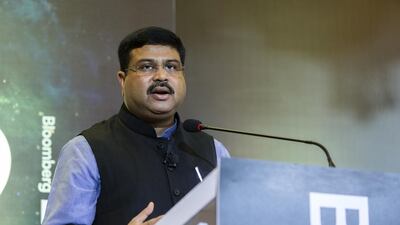India's petroleum minister has called on the Opec+ group of producers to "stabilise" prices, after prolonged output cuts pushed prices above $60 per barrel.
"India supported the production cut, but today we expect the producer countries, especially Opec countries, [to] do business as usual," Dharmendra Pradhan told CeraWeek by IHS Markit, which is being held online due to the pandemic.
"And out of that a responsible, reasonable price will come out, which is not today," he added.
Oil prices have surged nearly 17 per cent over the last month, supported by production outages in the US, where parts of the country were hit by a snowstorm. Continued restrictions on output by the Opec+ alliance have also been supportive of prices, which have rallied more than 25 per cent since the start of the year.
Opec+ first slashed production last year with the start of the pandemic, agreeing to a historic pact that restricted 9.7 million barrels per day of output for three months. The output cuts have since been tapered to 7.2m bpd, or the equivalent of 7 per cent of global supply. The group reversed earlier plans to bring 2m bpd of supply back to the markets by the beginning of 2021, disappointing consumers like India.
Demand recovery in centres such as Asia, notably China and India, as well as vaccine distribution programmes in developed economies have supported higher crude prices.
Oil prices have also gained from a weak US dollar, which has helped "supercycles" of commodities such as crude and copper. The base metal is trading at a nine-year high.
Opec+, which is headed by Saudi Arabia and Russia, met for a joint ministerial monitoring committee meeting on Wednesday. The committee did not issue any recommendations before the extraordinary meeting of ministers on Thursday.
The group is widely expected to increase its output incrementally to meet resurgent demand in Asia.
"There is demand normalisation, especially in Asia," Mr Pradhan said.
Higher crude prices may be supportive of producer economies, but are fiscally "challenging" to India, he added.
"We have to build roads, railways, airports, big projects. We have to create jobs, we have to regulate the economy. At that point of time, we need a reasonable price of our energy," he said.
Mr Pradhan, who is also minister of steel in the government of Prime Minister Narendra Modi, has been vocal in expressing his discontent with higher oil prices.
India's petroleum ministry under the Modi government has publicly appealed on several forums to Opec to consider the economic cost on consumers.
Oil producers are increasingly cognisant of India's demands as the country's energy consumption is expected to grow 25 to 35 per cent by 2030, according to the International Energy Agency.
Mr Pradhan noted that the country will pivot increasingly towards "alternative" fuels if it fails to reach favourable pricing for imported crude.
Opec's top producers, Saudi Arabia and Iraq, account for nearly 40 per cent of India's overall crude imports.
Gulf oil countries have looked to capture the lucrative Indian market by investing further downstream in refining and chemicals, for which the country still sees exponential growth.
Saudi Aramco and Abu Dhabi National Oil Company are investing in an integrated greenfield refining and petrochemicals complex on India's western coast, which is expected to cost as much as $70 billion.


